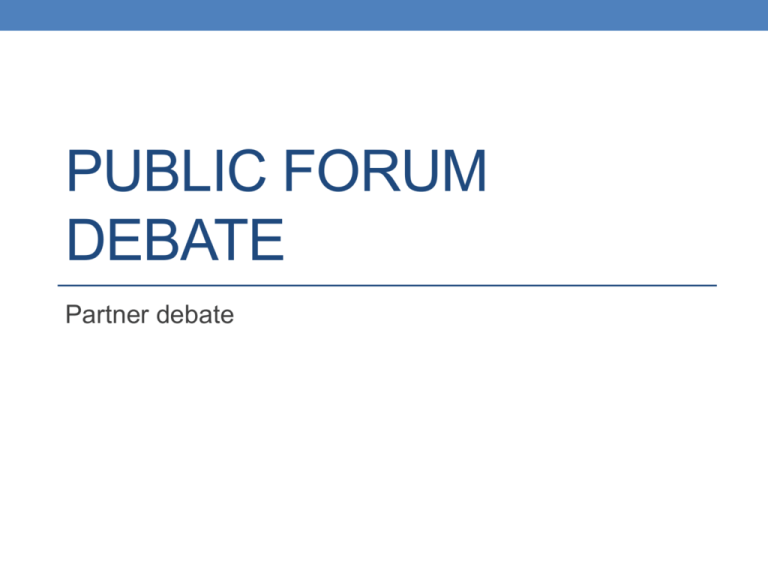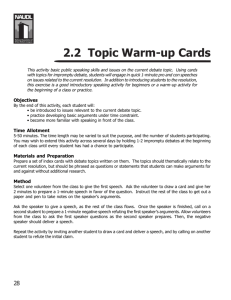public forum debate power point
advertisement

PUBLIC FORUM DEBATE Partner debate Resolution • The central component of Public Forum Debate is the • • • • • • resolution, which is the topic that the students debate. It is based on current events Examples Resolved: The costs of a college education outweigh the benefits. Resolved: The United States federal government should permit the use of financial incentives to encourage organ donation. This month’s resolution: Resolved: The United States Federal Government ought to pay reparations to African Americans. The resolution or topic changes every month Sides • The team that is for the resolution is called the affirmative or aff. • The team that is against the resolution is called the negative or neg. • Teams do not know which side they are debating until seconds before the round. This means they have to be prepared to defend either side. The way it works • You arrive at the tournament with the team on the bus • You go to the cafeteria and wait • Round 1 will be posted on a paper; it will look like this • PF CODES ROOM 2A 6B 110 7A 9A 111 9B 14C 112 14A 3A 113 5A 14B 114 6A 7B 115 1A 4A 116 The way it works continues • Find your code (I’ll tell you what it is on the bus) and go to • • • • • that room Wait for your judge to enter the room before you go in When both teams are there, one team chooses heads or tails and the judge or other team flips a coin Whoever wins the coin toss can choose either 1. What side they want to argue (aff. Or neg.) or 2. If they want to be the first or second team to talk If you win the coin toss, choose what side you are stronger in If you lose the coin toss, choose to be first speaker Where to sit First speaker Third speaker Team A Second speaker Fourth speaker Lectern Judge Team B Timing • Constructive speech • Constructive speech • Crossfire Team A first speaker, Team B first speaker • Rebuttal speech • Rebuttal speech • Crossfire Team A first speaker Team B first speaker Team A second speaker Team B second speaker Team A second speaker, Team B second speaker Summary speech Team A first speaker • Summary speech Team B first speaker • Grand Crossfire All members • Final Focus Team A second speaker • Final Focus Team B second speaker 4 min 4 min 3 min 4 min 4 min 3 min 2 min 2 min 3 min 2 min 2 min Constructive Speech • The first speech given on each side • Prepared ahead of time • The first speaker just reads it • It should include an introduction that frames and defines the resolution, then one or more contentions (points) that argue for the team’s position, followed by a conclusion • The speaker stands at the lectern and speaks to the judge Crossfire • A chance to ask/answer questions • Team A gets to ask the first question, unless they choose not to • It should go back and forth with turns, but this is not a rule and some debaters will just keep asking questions and bully their opponent • Widefield don’t play that way • Both speakers stand at the lectern, but face forward to look at the judge Rebuttal • this is the first opportunity for each team to refute, or • • • • • answer, the arguments made by their opponents. In this four-minute speech, the speakers are charged with disproving their opponent’s cases with their own analysis or with evidence from third-party sources. The first speaking team’s rebuttal will focus on refuting their opponent’s case the second speaking team’s rebuttal must both refute their opponent’s case and also respond to attacks made against their own case. This person is usually the stronger debater of the team The speaker stands at the lectern and speaks to the judge Summary speech • Following the second crossfire, the first speakers on each team deliver their summary speeches. • These speakers will attempt to summarize the main issues in the debate and continue to persuasively advocate for their position. • The speaker stands at the lectern and speaks to the judge Grand Crossfire • The grand crossfire is very similar to the other crossfires, except that all four debaters participate. • The debaters address one another and the judge but generally remain seated. • The grand crossfire is notorious for escalating tension, so all participants need to be mindful of decorum. Final Focus • The last speech of the debate is the final focus, which is delivered by the second speaker. • No new arguments may be made in the final focus; instead, the speaker concentrates on analyzing the arguments that have been made already and detailing for the judge why, on the merit of those arguments, her team should win the debate. • The speaker stands at the lectern and speaks to the judge Prep time • each team has two minutes of preparation time, just called “prep.” • Debaters may choose to use prep time at any point of the debate, but only between speeches or crossfires; debaters may not take prep time in the middle of a speech. • During prep time, partners may consult with each other over potential arguments to make or questions to raise during upcoming speeches or crossfires. • The two minutes of prep time is cumulative for the debate, so participants must manage this time wisely. Who wins? • The judge determines the winner based off of who convinced him. • He also considers evidence used, ethical behavior, and how well you spoke • You do not find out if you won or lost until we have left the tournament • Show ballot example Rounds • You do this 3 times • If you win all 3 of your rounds, you go on to the finals • 1st-6th place get awards HOW TO FLOW A ROUND Keeping notes Watch me • See how I take short hand notes • And keep track of arguments that were attacked and not attacked • Keep track of which arguments are backed by evidence • Use handout • https://www.youtube.com/watch?v=sdNg3F7aBcM • Your turn • https://www.youtube.com/watch?v=4ll_9bKFyXA RESOLUTION 3 types of resolutions • Resolutions of Fact: Resolutions that question whether or not a piece of information about the world is true. • Example Resolved: U.S. policies established after September 11, 2001, have substantially reduced the risk of terrorist acts against the United States.” • This resolution requires that the affirmative prove two things: that the risk of terrorist attacks has been reduced and that the policies established after September 11 caused that reduction 3 types of resolutions • Resolutions of Value: Resolutions that question a particular ideal or a set of judgments about the world. • Example “Resolved: When the values are in conflict, the United Nations should prioritize global poverty reduction over environmental protection.” • This would lead to a discussion surrounding why prioritizing global poverty reduction has more benefits than environmental protection and, thus, a normative evaluation of global poverty reduction. 3 types of resolutions • Resolutions of Policy: Resolutions that question a particular course of action. • Example Resolved: Direct popular vote should replace Electoral College vote in U.S. presidential elections.” • To win, the affirmative team must prove that direct popular vote replacing the Electoral College would be the ideal reality. Building a case • Once you know the resolution, determine what the main • • • • • • issues will be Begin creating a column of aff and neg points of arguments or contentions Begin researching Choose the 3 strongest points and focus on those Don’t get rid of the other stuff, this may come in handy during a debate Write your two cases or constructive speeches See handout







